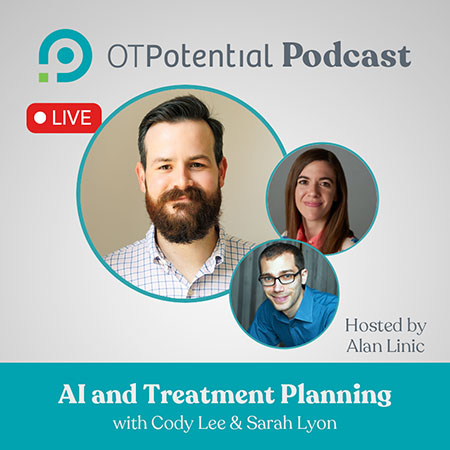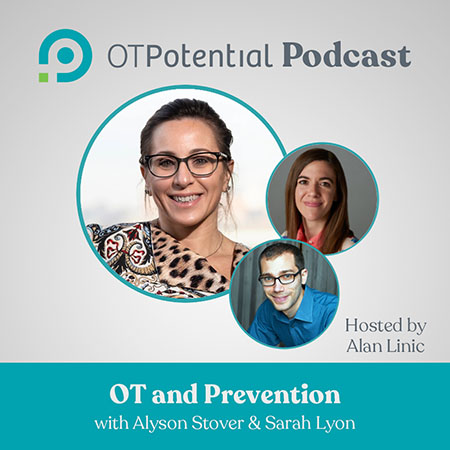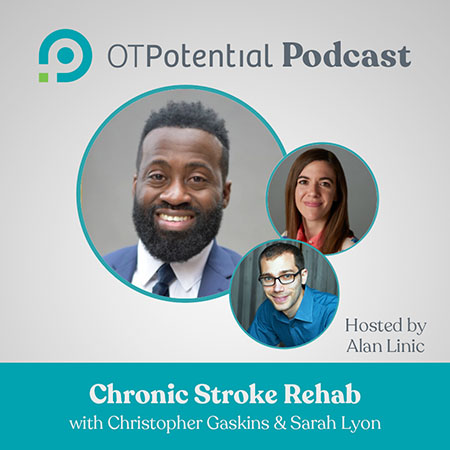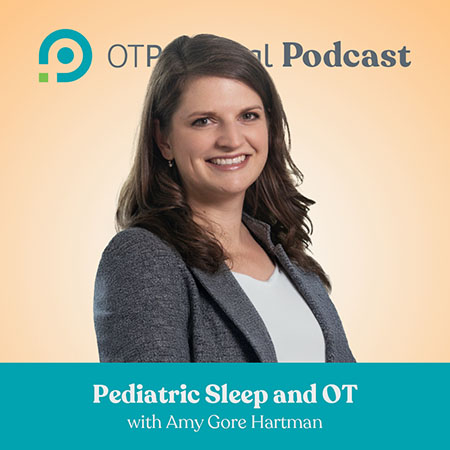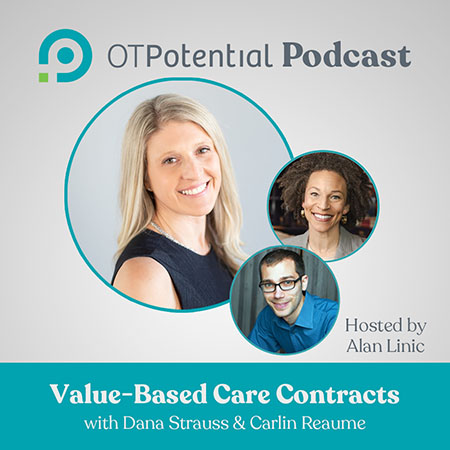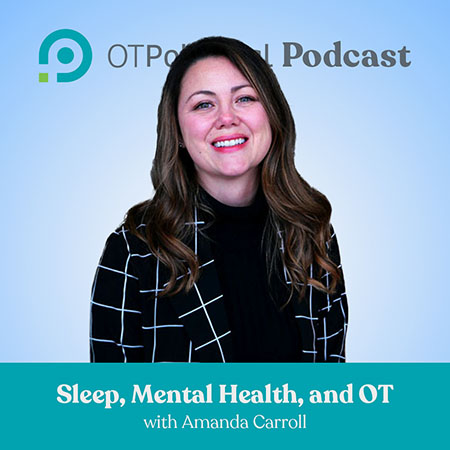Earn 1 hour of continuing education by joining OT Potential after taking this course.
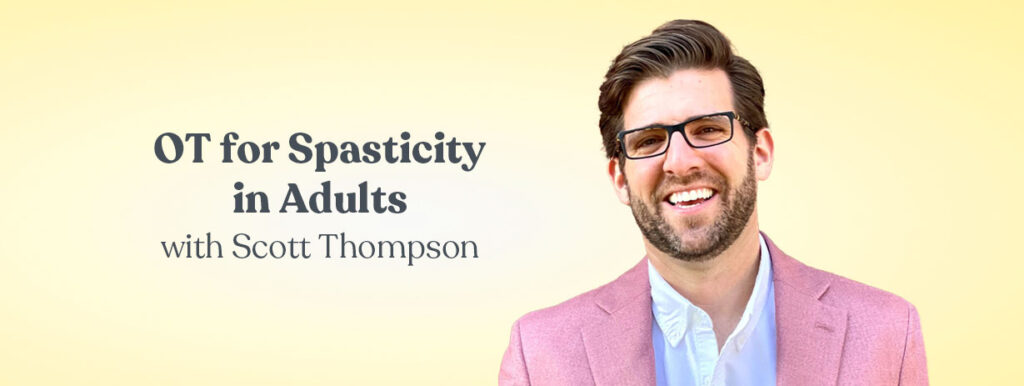
Listen: Apple | Spotify | Google
Spasticity can be present in many of the conditions we treat as occupational therapy professionals.
And, it can add significant cost and burden for our patients.
The article we are discussing in this 1-hour course gives you a big picture overview of the science behind what we know (and don’t know!) about spasticity.
You’ll find certain approaches (that I’ve personally used!) that have NOT been supported by the research—but also which modalities have a growing body of evidence behind them.
After reviewing the research, we’ll be joined on the podcast by neuro OT, Scott Thompson, OTD, MOT, OTR/L, CRSR, LSVT-BIG to discuss implications for your practice!
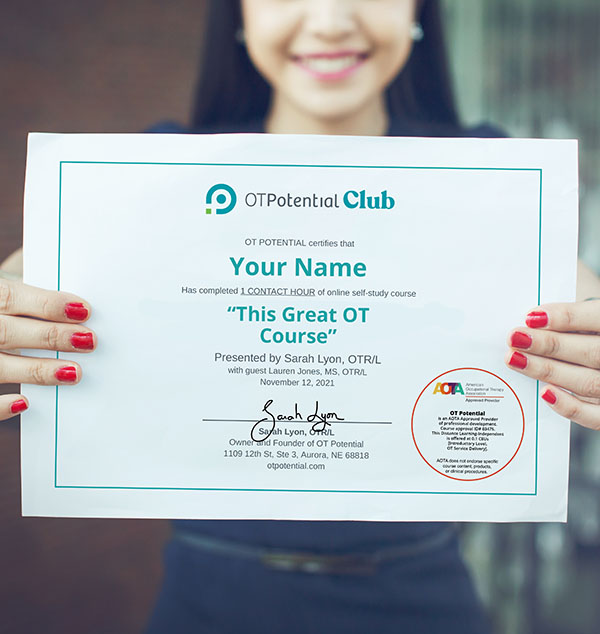
Earn 1 hour of continuing education
1. Listen to the podcast for free.
2. Sign up for the OT Potential Club.
3. Pass the quiz and download your certificate!
Primary Journal Article Explored
When you log in, be sure to check out the OT Potential Club’s written breakdown of the following research article. Then, share your questions and thoughts with fellow practitioners.
Supporting Research and Journal Articles
- Stretching and splinting interventions for poststroke spasticity, hand function, and functional tasks: A systematic review
- Artificial Neural Network learns clinical assessment of spasticity in modified Ashworth Scale
Learning Objectives
- You will be able to identify interventions with moderate quality evidence for reducing spasticity in adults
- You will be able to recognize interventions with low quality evidence for reducing spasticity in adults
Resources
Starting and running your neuro OT clinic:
- NeuPT Tech
- Physical Therapy Private Practice: Secrets of the Top 10%
- Next Level OT
- Wantrepreneur to Entrepreneur Podcast
Clinical decision making related to spasticity:
Agenda
Intro (5 minutes)
Breakdown and analysis of journal article (5 minutes)
- What is spasticity?
- Prevalence in common conditions & increased burden
- Current treatments
- Why this review was needed
- Methods
- Results
- Discussion
- Takeaways for OT practitioners
Discussion on practical implications for OTs (with Scott Thompson) (50 minutes)
- Tell us how you first found OT.
- How did you become interested in neuro OT and health tech?
- What were your initial impressions of the article?
- It seems like when I see a patient with spasticity on my caseload: I should begin thinking this is a patient with an increased burden for their condition, and that I need to be collaborating with a team. Is that true?
- How do you assess spasticity?
- How do you think about matching the mechanism of different treatment options, with specific types of spasticity?
- What stood out to you about the different modalities that were listed?
- Tell me about logistically how you use your fave modalities in the clinic?
- Are there more options coming to the market for patients to be leveraging different modalities at home?
- What do you see as the business models that will best serve patients in leveraging OT and health tech to manage their spasticity?
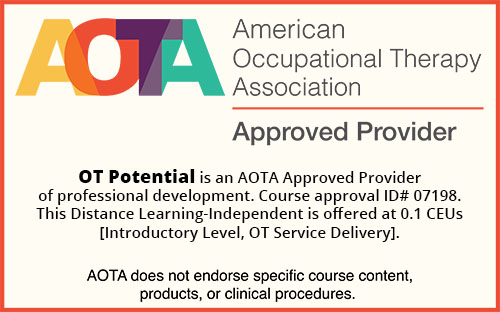
Instructional Methods/Registration/Special Needs Requests/Cancellation Policy
This course is an independent/self-study course delivered via podcast on iTunes, Spotify, Google Play & more.
If you need accommodations to take this course, please contact us and we will address your needs on an individual basis.
If we cancel a promoted course, event, live stream, or any other paid CEU offering prior to release, and you subscribe explicitly for said offering, you are eligible for a full refund if you did not complete and earn any other CEU quizzes or certificates during your subscription.
If a live webinar is cancelled that you signed up for, our system will automatically generate an email to you and if possible, we will inform you of the rescheduled date. Our most current webinar schedule will be found at: otpotential.com/live-ot-ceu-webinars.
Course Completion Requirements
In order to receive a certificate for this course, you must first participate in the podcast/webinar in its entirety. Then, you will need to take the quiz that will accompany the course and earn 75% or higher. If you pass, a certificate will be automatically generated and sent to your email. Quizzes for live (distance learning–interactive) webinars must be completed within 3 days of completing the webinar.
Target Audience/Educational Level
Our target audience is occupational therapy practitioners who are looking to learn about OT for Spasticity in Adults. The educational level is introductory.
Financial and Non-financial Disclosures
It is the policy of OT Potential to disclose any financial and non-financial interest the provider or instructor may have in a product or service mentioned during an activity. This is to ensure that the audience is made aware of any bias of the speaker.
We here at OT Potential have no financial stake in this topic. Our guest, Scott Thompson, also has no financial disclosures.
Speakers
Scott Thompson, OTD, MOT, OTR/L, CSRS, LSVT BIG
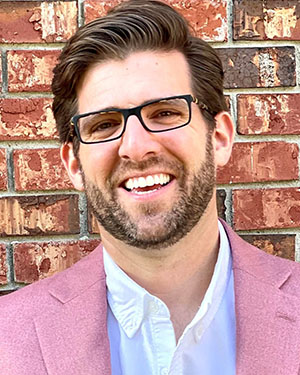
Dr. Scott never stops learning, whether through continuing education, reading the latest research, or through his clients’ stories…Because knowledge is power.
Education:
- Doctor of Occupational Therapy, Rocky Mountain University of Health Professions
- Master of Occupational Therapy, University of St. Augustine for Health Sciences
- Bachelor of Science, Kinesiology, Indiana University
Certifications:
Scott has numerous advanced neurological rehabilitation certifications. He is a Certified Stroke Rehab Specialist (CSRS), an LSVT BIG trained therapist, and is Saebo Certified, and is currently working on two more certifications for upper and lower extremity expertise. Read full bio.
Sarah Lyon, OTR/L

Sarah’s passion is helping fellow OT practitioners translate evidence into daily practice. Sarah earned her BA in religion from St. Olaf College, then earned her master’s degree in occupational therapy from New York University in 2011.
Since then, she’s worked in numerous facilities, including a critical access hospital, an acute trauma hospital, and a state inpatient psychiatric hospital. Sarah is the founder/owner of OT Potential. Read more about OT Potential here.
This course was designed to meet your continuing education requirements
We designed the courses in the Club to meet the requirements for “online” and “independent/self-study” courses. To verify the requirements from your specific state (within the US), check out our post, OT Continuing Education Requirements. If you are outside of the United States and have questions, please contact us.
We are proud to be an AOTA Approved Provider and to meet the requirements for your NBCOT renewal.
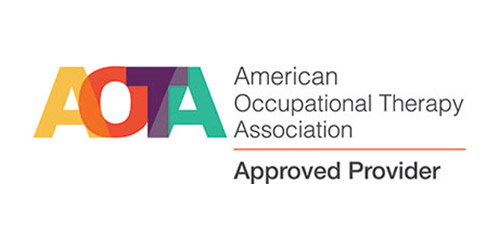
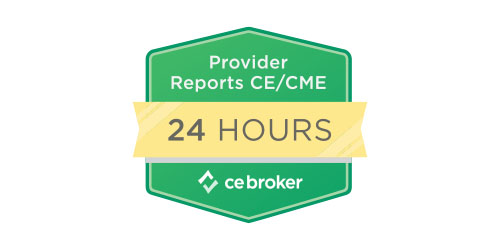
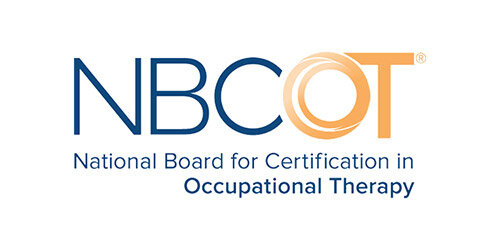
See our other OT courses!
OT for Spasticity in Adults • OT Potential
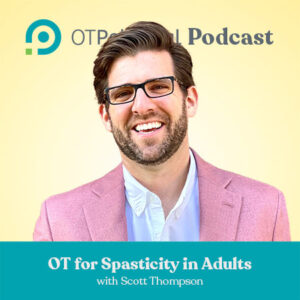
Today we’ll be covering “OT for Spasticity in Adults.” We’ll look at new research and discuss it with Scott Thompson.
Course Provider: Organization
Course Provider Name: OT Potential
Course Provider URL: https://otpotential.com/
Course Mode: Online
Start Date: 2023-06-05
Duration: 01:00:00
Repeat Count: 5
Repeat Frequency: Yearly
Course Type: Subscription
4.76

